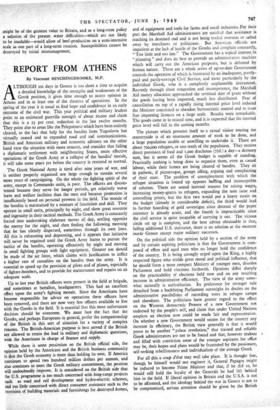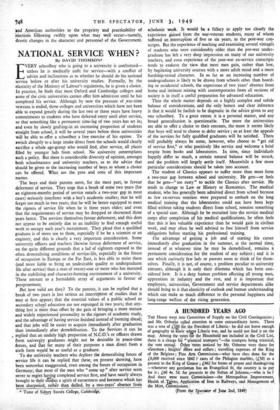REPORT FROM ATHENS
By Viscount H1NCHINGBROOKE, M.P.
ALTHOUGH ten days in Greece is too short a time to acquire a detailed knowledge of the strengths and weaknesses of the Greek position, it gives time enough to assess opinion in Athens and in at least one of the theatres of operations. In the spring of the year it is usual to find hope and confidence in an early outcome of the civil war. This year political and military leaders point to an estimated guerrilla strength of about 20,000 and claim that this is a 25 per cent, reduction in the last twelve months. They point also to areas like the Peleponnese which have been entirely cleared, to the fact that help for the bandits from Yugoslavia has virtually ceased and to expanded road and rail communications. British and American military and economic advisers on the other hand view the situation with more concern, and consider that failing a diplomatic settlement with neighbouring States, more effective operations of the Greek Army or a collapse of the bandits' morale, it will take some years yet before the country is restored to normal.
The Greek National Army is tired after nine years of war, and is neither properly organised nor large enough to sustain several more years of campaigning. On the whole the fighting spirit of the army, except in Commando units, is poor. The officers are discon- tented because they serve for longer periods, get relatively worse leave and welfare facilities than the men and because promotion is insufficiently based on personal prowess in the field. The morale of the bandits is maintained by a mixture of fanaticism and skill. They operate in small units, principally by night, and show great resource and ingenuity in their tactical methods. The Greek Army is constantly forced into undertaking elaborate moves all day, settling opposite the enemy for the night, and then finding the following morning that he has silently dispersed, sometimes through its own lines. All this is exhausting and depressing, and it appears that initiative will never be regained until the Greek Army learns to pursue the tactics of the bandits, operating offensively by night and moving in small fighting groups with light equipment. Greater use should be made of the air force, which claims with justification to inflict a higher rate of casualties on the bandits than the army. It is essential to speed up the provision of pilots and of planes, especially of fighter-bombers, and to provide for maintenance and repairs on an adequate scale.
Up to last year British officers were present in the field at brigade, and sometimes at battalion, headquarters. This had an excellent effect upon the army's fighting morale. Since the Americans have become responsible for advice on operations these officers have been removed, and there are now very few officers available to live with the Greeks in the field. It is essential that this most unfortunate decision should be overcome. We must face the fact that the Greeks, and perhaps Europeans in general, prefer the companionship of the British in this sort of situation for a variety of complex reasons. The British-American purpose is best served if the British are allowed to retain the lead in military and diplomatic questions, with the Americans in charge of finance and supply.
While there is some pessimism on the British official side, the opinion held by the Americans and the British business community is that the Greek economy is more than holding its own. If America continues to spend two hundred million dollars per annum, and also continues to meet the Greek military commitment, the position will undoubtedly improve. It is considered on the British side that the U.S. programme is too much concerned with long-range projects inch as road and rail development and hydro-electric schemes, Ind too little concerned with direct consumer assistance such as the novision of building materials and furnishings for destroyed homes, and of equipment and tools for farms and small industries_ For their part the Marshall Aid administrators are satisfid that assistance is reaching its destined end and is not being traded overseas or salted away by merchants or politicians. But American officials are impatient at the lack of hustle of the Greeks and complain constantly, "Too little and too late." The Government has a topical interest, in " planning " and does its best to provide an administrative machine which will carry out the American purposes, but is defeated by human nature. There are a whole series of up-to-date Government controls the operation of which is frustrated by an inadequate, poorly- paid and partly-corrupt Civil Service, and more particularly by the individual Greek, who is a completely tuiplannable instrument. Recently through sheer congestion and incompetence, the Marshall Aid money allocation approached the terminal date of grant without the goods having been imported, much less distributed. Fear of cancellation on top of a rapidly rising internal price level induced the Minister concerned to abandon bureaucratic control and to issue free importing licences on a large scale. Results were remarkable. The goods came in in record time, and it is expected that the internal price level will fall in the coming months.
The picture which presents itself to a casual visitor touring the countryside is of an enormous amount of work to be done, and a large population unable or unwilling to undertake it. There are about 700,000 refugees, or one-tenth of the population. They receive direct provision of food and t,000 drachmas (71d.) a day—a derisory sum, but it seems all the Greek budget is capable of standing. Practically nothing is being done to organise them, even as casual labour, while their homes are being cleared of bandits. They sit in pathetic, if picturesque, groups idling, arguing and complaining of their state. The problem of unemployment with which the refugee situation is bound up appears baffling and insusceptible of solution. There are sound internal reasons for raising wages,. increasing money-grants to refugees, expanding the note issue and controlling prices, but the first two would put a heavy strain on the budget (already in considerable deficit), the third would lead to further hoarding of gold sovereigns since distrust of the paper currency is already acute, and the fourth is impracticable since the civil service is quite incapable of carrying it out. The vicious circle set up is complete, and the best advice obtainable is that, failing additional U.S. assistance, there is no solution at the moment inside Greece except major military successes.
On the political side the opinion held by a section of the army and by certain aspiring politicians is that the Government is com- posed of effete and aged men who no longer hold the confidence. of the country. It is being strongly urged upon the King, a highly respected figure who wields great moral and political influence, that he should form a more compact Ministry of younger men, dissolve Parliament and hold elections forthwith. Opinions differ sharply on the practicability of elections held now and on any resulting increase in administrative efficiency. The view of the army some- what naturally is authoritarian. Its preference for stronger rule detached from a backbiting Parliament outweighs its doubts on the administrative possibilities of recording votes in refugee camps and elsewhere. The politicians have greater regard to the effect on the Western democratic Powers of a new Government not endorsed by the people's will, and claim that under United Nations auspices an election now could be made fair and representative. On whether a new Government would secure for the country any increase in efficiency, the British view generally is that it would prove to be another "palace revolution," that trained and reliable Greek administrators are not to be found and that, however zealous 11 and filled with conviction some of the younger aspirants for office may be, their hopes and plans would be frustrated by the passionate, self-seeking rebelliousness and individualism of the average Greek.
For all this a coup d'eurt may well take place. It is thought that, though he himself would not engineer it, General Papagos might be induced to become Prime Minister and that, if he did so, he would still hold the loyalty of the Generals he had left behind him in the field. If liberal opinion in Britain and the U.S.A. is not to be affronted, and the ideology behind the war in Greece is not to be compromised, serious attention should be given by the British
and American authorities to the propriety and practicability of elections following swiftly upon what may well occur—namely, drastic changes in the character and personnel of the Government.



































 Previous page
Previous page